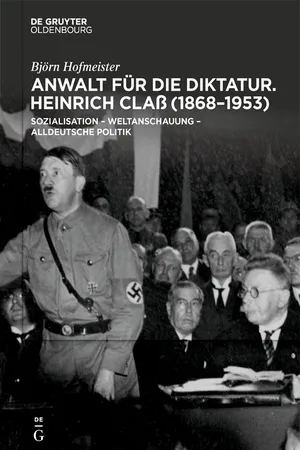
Anwalt für die Diktatur
Heinrich Claß (1868–1953). Sozialisation - Weltanschauung - alldeutsche Politik
- 859 Seiten
- German
- ePUB (handyfreundlich)
- Über iOS und Android verfügbar
Anwalt für die Diktatur
Heinrich Claß (1868–1953). Sozialisation - Weltanschauung - alldeutsche Politik
Über dieses Buch
Björn Hofmeister's biography of Heinrich Claß is devoted to one of the most influential representatives of the "national opposition" that shaped extra-parliamentary politics of the nationalist Right between Imperial Germany and the Third Reich. Claß, who chaired the Pan-German League between 1908 and 1939, was a lawyer by profession and became active in the antisemitic and völkisch movement around the turn of the century. Claß was demanding the implementation of völkisch dictatorship long before World War I, which he understood to be the foundation of cultural, ethnic, and political renewal of German society. His demands for territorial expansion of the German Empire that would match the ethnic distribution of "Germanness" in Central Europe as well as imperial interests as a great power made him the spokesman of Germany´s radical war aims movement between 1914 and 1918.
Following the downfall of Imperial Germany as a result of revolution and democratization he remained a major player in the networks of the Weimar Republic's radical Right. In a long-running campaign, he helped to get his friend, chairman of the German National People's Party (DNVP) and founding member of the Pan-German League, Alfred Hugenberg, appointed as chairman of the DNVP in 1928. Following Hugenberg's takeover of what was Germany's largest conservative party at the time, Claß turned the Pan-German League into a propaganda agency promoting Hugenberg as a candidate for the office of Reich Chancellor and, subsequently, as the head of a future bourgeois dictatorship cabinet.
The DNVP's following cooperation with the Nazis, however, shifted the power balance within the radical Right in times of massive political change and, in January 1933, ultimately led to an alliance between the German Nationals and the Nazis in the formation of the Hitler cabinet, which enforced competition and rivalry with the notables of the radical Right, but also implemented major political, antisemitic and racist points that Claß had been demanding for decades.
For the first time, Björn Hofmeister explains Claß's role within the radical Right from Imperial to Nazi Germany in full detail, embedding his biography within the context of his social background, ideological socialization, academic training, professional practice, and legal thought, all of which shaped his political concepts of a radical bourgeois dictatorship government.
Häufig gestellte Fragen
- Elementar ist ideal für Lernende und Profis, die sich mit einer Vielzahl von Themen beschäftigen möchten. Erhalte Zugang zur Basic-Bibliothek mit über 800.000 vertrauenswürdigen Titeln und Bestsellern in den Bereichen Wirtschaft, persönliche Weiterentwicklung und Geisteswissenschaften. Enthält unbegrenzte Lesezeit und die Standardstimme für die Funktion „Vorlesen“.
- Pro: Perfekt für fortgeschrittene Lernende und Forscher, die einen vollständigen, uneingeschränkten Zugang benötigen. Schalte über 1,4 Millionen Bücher zu Hunderten von Themen frei, darunter akademische und hochspezialisierte Titel. Das Pro-Abo umfasst auch erweiterte Funktionen wie Premium-Vorlesen und den Recherche-Assistenten.
Bitte beachte, dass wir Geräte, auf denen die Betriebssysteme iOS 13 und Android 7 oder noch ältere Versionen ausgeführt werden, nicht unterstützen können. Mehr über die Verwendung der App erfahren.
Information
Inhaltsverzeichnis
- Title Page
- Copyright
- Contents
- Dank
- Einleitung
- 1 Sozialisation und Weltwahrnehmung: Personen, Regionen und Institutionen
- 2 Wege zur Macht
- 3 Führungswille und Oppositionspolitik
- 4 Kriegszielpolitik und der Primat des Staates
- 5 Radikalisierungspolitik und Revolutionserfahrung
- 6 Sammlungsversuche und Diktaturpolitik
- 7 Diktaturplanungen und Putschgerüchte 1925/26
- 8 Politik der parlamentarischen Legalität
- 9 Umgehungen und Entscheidungen 1932
- 10 Staatsrechtliche und politische Positionierungen 1932/33
- 11 Das Hitler-Hugenberg-Papen-Seldte-Kabinett 1933
- 12 Im Nationalsozialismus 1933/39
- 13 Zwischen Zweitem Weltkrieg, Nachkriegsordnung und deutscher Teilung 1939 – 1953
- Schlussbetrachtungen
- Anhang 1
- Anhang 2
- Abkürzungsverzeichnis
- Abbildungsnachweis
- Personenregister